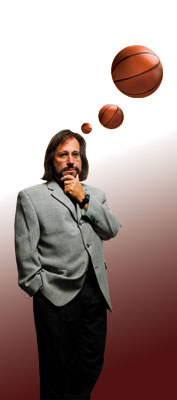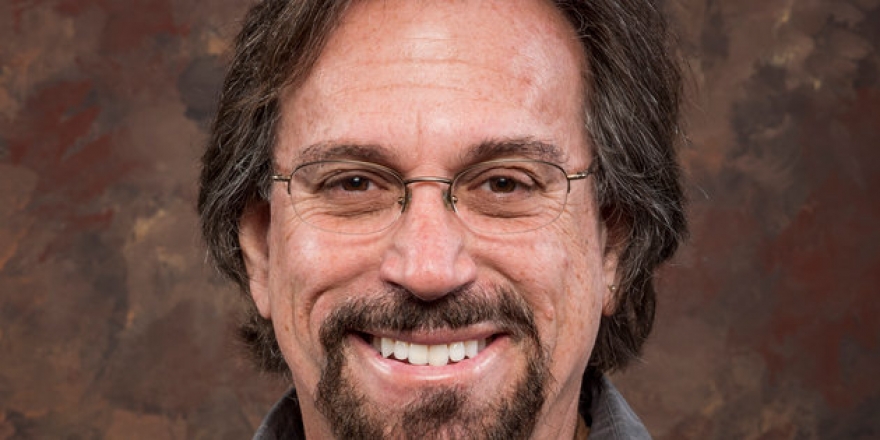There’s a prominent family in Los Angeles, and like most families, they have had their share of dysfunctional moments. This wellknown basketball dynasty goes by the name “Lakers,” and by the summer of 2007, sibling rivalry among players threatened their teamwork on the court.
 David Levy
David Levy
The “golden child” Kobe Bryant publicly battled his ego and burden of responsibilities, while patriarchs of the family struggled to control their charges. It was definitely time for some family therapy. Lucky for the Lakers and all their supporters, in late 2007 the Los Angeles Times featured a public therapy memo directed at the team. And lucky for longtime Lakers fan David Levy, professor of psychology at the Graduate School of Education and Psychology, that columnist Kurt Streeter sought him out to conduct the much-needed psychoanalysis.
Levy is a licensed marriage and family therapist, and he jumped at the chance to call the Lakers out on some of their issues through couch-less therapy. A Los Angeles-area native, Levy sees the Lakers as much more than just a basketball team. They are like his extended family; they’re in his blood. As Levy says, “I’m a Lakers fan by DNA.”
“Back in 2007, the Lakers were chaotic and fighting a lot, with very little respect for each other and a lot of jealousy,” he continues. “Kobe’s teammates were looking at him with a mixture of both envy and respect, as often happens in families with an overachieving member.”
Instead of acting as a responsible brother, Bryant was complaining about management and publicly pushing for the transfer of youngest player Andrew Bynum, who could have been called the runt of the family at that time. Former player and manager, the legendary Jerry West, symbolized the absent, idealized father, having left the fold in 2002. Current manager Mitch Kupchak was the stepfather who, as Streeter said in his article, “can do no right.”
Levy’s family theory is applicable to most any athletic team: a talented individual is inserted into an established group and suddenly they have a dozen siblings vying for stardom; they clamor for attention, seek recognition and approval from family elders, and sulk or act out when they feel mistreated.
“Even young kids, who are by nature selfish, have a sense of fairness that if their brother gets two marbles then they also deserve two,” Levy observes, adding, “the idea of fairness is really important in sports.”
Levy is as interested in the analysis of sports in culture as he is in Lakers-specific thinking. Just as teams become little families of their own, the fans embrace them as part of a larger family. He says, “We like being a part of something bigger than ourselves. Whether it’s live at the venue or on television, sports give us a sense of community which in today’s world is something people are missing.”
As Levy acknowledges, “If my team wins, I say ‘we won,’ as if I were on the court with them.”
But of course, most people aren’t on the court, and therein lies the fundamental reason for the athlete in our cultural psyche: the warrior hero. What makes idolization of athletes unique in the celebrity world is the clarity of outcomes, says Levy. “It’s more primal. With a music star, there is no obvious competition, but for a sports star there is a clear victor.”
Victory is the ultimate goal, and why Levy calls sports a “metaphor for war.” Fans are civilians supporting their troops, coaches and managers are generals and captains, and players are the soldiers.
“The parallels are striking,” Levy explains. “There are the opposing sides of the victor and the vanquished, there is physical contact, and it’s all governed by rules. It’s the human desire for aggression expressed in socially acceptable ways, and the need for superiority, the need to win.”
Levy is the author of Tools of Critical Thinking: Metathoughts for Psychology (2nd edition, 2009) andCross-Cultural Psychology: Critical Thinking and Contemporary Applications (4th edition, 2009), and has been featured on numerous media outlets such as CBS, CNN, NBC, KABC, PBS, and the E! Channel, commenting on current events and cultural trends; but this was Levy’s first time acting as a sports psychologist.
His advice proved so popular that he was interviewed for a further three articles in the 2007-08 season; he doesn’t know for sure if the Lakers read his advice, though he heard from Streeter that they did. What he does know is that during the season and sometime between the first and fourth articles in the series, the family dynamics seemed to shift.
“The team as a whole seemed to communicate better,” he says, noting that the players became more willing to pass the ball. Though the Boston Celtics beat the Lakers in the tense 2008 NBA finale—a “bitter loss” for Levy and his fellow Los Angelenos—greater cohesion between the Lakers players took them all the way to the 2009 finals. On June 14, the Lakers beat the Orlando Magic and took home their first NBA championship in seven years.
Levy observed two key changes in the behavior of the “golden child” that helped lead the team to victory. “One was the psychological maturity of Kobe Bryant and his emergence as a true leader; he’s now encouraging an atmosphere where his teammates want to follow him. Another factor was that he was willing to be a decoy and pass to another man; it was what we in psychology call the ‘super-ordinate goal.’ It’s seeing what is important to the community as a whole, which in this case was winning as a team. Kobe now sees that it’s not all about him.”
As a psychologist Levy hopes the Lakers can keep their family issues and “internal chaos” in the past and continue to work as a strengthened unit towards the future. And as a fan, he is personally invested in their continued functionality. Levy thinks back to that thrilling moment on June 14, the culmination of everything he and Streeter hoped to achieve with their therapy series. “It was absolute, pure joy,” he says.
